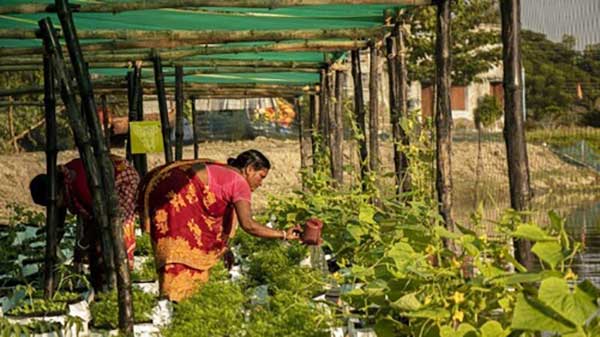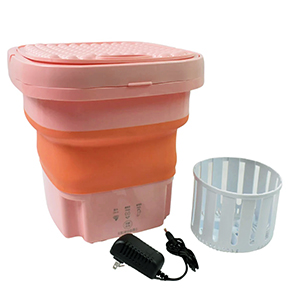Community programme on locally-designed floating farms, run by the South Asian nature Forum for Environment (SAFE) and supported by the Adaptation Fund, for flood-stricken communities in the Sundarbans region is among 23 civil society organisations selected by the Global Environment Facility (GEF) for the Inclusive GEF Assembly Challenge Program.
The programme is a novel initiative reflecting commitment to support and elevate community-driven climate and nature projects and the unique contributions of indigenous peoples, women, girls, and young people across the GEF partnership.
The winning projects were announced during the GEF Assembly, a once-every-four-year gathering of 185 countries taking place this week in Vancouver, Canada.
Each awardee will receive a grant of up to $100,000 and gain access to networking, training, and knowledge exchange opportunities through the GEF, a family of funds that finances international efforts to address biodiversity loss, pollution, and climate change.
The winning organisations will be celebrated during the assembly's Partnership Forum and will share their experiences in a number of panels and sessions throughout the week, reflecting the GEF's focus on supporting environmental action and results through a "whole of society" approach.
SAFE's initiative is designed to naturalise hydroponic float-farming and integrated aquaculture as an adaptive, climate-resilient agricultural method for vulnerable communities in coastal South Asia.
It is designed not only to improve people's nutrition and food and livelihood security, but to create opportunities for agro-business entrepreneurship.
Emission-less regenerative farming in float-farm growbags with recycled organic soil-mix is supported by solar desalination and micro-irrigation systems.
The 23 winners were chosen from nearly 600 applications, by a selection panel made up of the GEF's CSO Network, Scientific and Technical Advisory Panel, Indigenous Peoples' Advisory Group, and Gender Partnership, as well as youth representatives linked to international environmental conventions.
They span 26 countries including Antigua and Barbuda, Belize, Bolivia, Cameroon, China, Colombia, Costa Rica, Congo, Ecuador, Haiti, India, Kenya, Kiribati, Madagascar, Mexico, Nigeria, Peru, Sierra Leone, Somalia, South Africa, South Sudan, St Vincent and the Grenadines, Tanzania, Thailand, Tunisia, and Uganda.
The winning initiatives include a project applying the Maasai peoples' indigenous knowledge for climate resilience in Tanzania; an effort to mobilise rural youth in Costa Rica to preserve biodiversity; activities to bring together women and girls to protect coastlines in Antigua and Barbuda; and a project aiming to empower marginalised and vulnerable groups in Thailand to adapt to climate change.
Esther Morenikeji Emmanuel of U-recycle Initiative Africa, one of the winning groups, said support from the Inclusive GEF Assembly Challenge Program would help expand the organisation's efforts to reduce plastic waste in Nigeria.
"If you want to see change, you have to start small in the areas where you can have a direct impact," she said. "It is also easy to begin taking action locally because you can see the issues so clearly."
Tom Bui, Canada's representative on the GEF Council, welcomed the Inclusive GEF Assembly Challenge Program as a cornerstone of the gathering in Vancouver where a record number of civil society representatives are sharing their perspectives and priorities, on the stage and at the table.
"The only way we can achieve lasting transformational change to safeguard a livable planet is by listening to each other," he said. "We need to embrace our differences and tap the rich diversity of views existing in all societies. This programme does this by celebrating our unsung environmental heroes."
GEF CEO and Chairperson Carlos Manuel Rodriguez said: "Global environmental challenges affect us all, but their impacts are almost entirely locally felt. It is our privilege to celebrate and fund these locally-designed, locally-led remedies for climate resilience, coastline protection, biodiversity conservation, and more."
"The Inclusive GEF Assembly Challenge Program is a concrete example of our focus on supporting civil society and lifting up the voices and innovations of indigenous peoples, women, youth, and others who have been historically under-represented in international environmental financing and policy," Rodriguez added.






Agartala MBB Airport gets new domestic air cargo terminal
The state transport minister Sushanta Chowdhury on Monday inaugurated the domestic air cargo terminal here at Agartala MBB Airport and said that the airport will soon receive the tag of international airport.
Court sentences four Bihar residents to 10 years RI
Six years after four persons from Bihar were detained for smuggling 29.5 kg of cannabis from Agartala in the Humsafar Express, the Additional Sessions Judge Court, Dharmanagar, North District of Tripura, on Monday convicted them and sentenced them to ten years of rigorous imprisonment.
Pradyot calls for respect to traditional heads amid temple land dispute
Tipra Motha Party founder and royal scion, Pradyot Kishore Manikya Debbarma, has urged the government to acknowledge and respect the authority of Samajpatis (traditional heads) and Chantai (priests) in matters concerning temple development projects.
29 Bangladeshi nationals, seven touts held in Tripura
The Border Security Force (BSF), Tripura, has enhanced vigil and intensified its domination along the international border and detained 29 Bangladeshi nationals and seven Indian touts in last four days.
J.P. Nadda holds meeting with Tripura BJP leaders; discusses party-related issues
Bharatiya Janata Party (BJP) national president J.P. Nadda on Sunday held an important meeting with Tripura's state unit leaders including Chief Minister Manik Saha and discussed various party affairs.
One body recovered from Telangana tunnel on day 16 of rescue operation
Rescue workers on Sunday - the 16th day of the operation - pulled out the body of one of the eight missing persons from the partially collapsed SLBC tunnel in Telangana’s Nagarkurnool district after the cadaver dogs from Kerala identified the spot for presence of human remains under the rubble.
FM says GST rates to be reduced further, rationalised; Congress demands overhaul
Union Finance Minister Nirmala Sitharaman has said that Goods and Services Tax (GST) rates will be reduced further as the process of rationalising tax slabs is nearing completion.
'Anti-incumbency is an issue of the past now': J.P. Nadda hails PM Modi's leadership in Tripura rally
Bharatiya Janata Party (BJP) national president J.P. Nadda on Sunday said that the political culture in India has changed after Narendra Modi became Prime Minister, adding that people earlier used to talk about the anti-incumbency factor against the government.